Developing story
Sudan crisis response
How MSF is responding to urgent needs inside Sudan and in neighboring countries.

Developing story
How MSF is responding to urgent needs inside Sudan and in neighboring countries.
Jul 22, 2024 — A report released by Doctors Without Borders/Médecins Sans Frontières (MSF) today reveals a collapse in the protection of civilians in Sudan, where communities continue to face indiscriminate violence, killings, torture, and sexual violence while attacks on health workers and medical facilities persist. The report, A War on People: The Human Cost of Conflict and Violence in Sudan, describes how both the Sudanese Armed Forces (SAF) and the Rapid Support Forces (RSF), along with allied groups, are inflicting horrendous violence on people across the country. The war has wrought a catastrophic toll since fighting began in April 2023, with hospitals attacked, markets bombed, and houses razed to the ground.
On April 15, 2023, intense fighting broke out between the Sudanese military, or Sudanese Armed Forces (SAF) and the Rapid Support Forces (RSF) in Khartoum, Sudan. The violence quickly spread across most of Sudan, killing and injuring thousands and forcing millions of people from their homes.
Doctors Without Borders/Médecins Sans Frontières (MSF) teams in Sudan are treating war-wounded patients with catastrophic injuries and providing humanitarian aid and medical care in refugee camps and displacement sites, where people are living in poor conditions and lack adequate health care and basic needs. More than 10 million people have been displaced by the current conflict, including over 2 million people who have fled to neighboring countries such as Chad and South Sudan.
Photo above: Sudan 2024 © Juan Carlos Tomasi/MSF
For more than a year, large parts of Sudan have been experiencing ongoing violence, including intense urban warfare, gunfire, shelling, and airstrikes. The health system, already fragile before the conflict started, is struggling to cope with existing and emerging medical needs while facing overwhelming pressure from the destruction and looting of health facilities, acute shortages of utilities and medical supplies, and under-resourced, unpaid, and overworked personnel. As a result, people face significant challenges accessing medical care throughout the country.
The violence has taken on an ethnic dimension in Sudan’s Darfur region, which was devastated by another war in the early 2000s. Refugees who have fled from West Darfur to Chad describe an unbearable spiral of violence, with looting, homes burned, beatings, sexual violence, and massacres, particularly targeting the Masalit ethnic minority.
Sudan is experiencing the world’s largest and fastest-growing internal displacement crisis. More than 10 million people—1 in 5 people in the country--are currently internally displaced and over 2 million have crossed the borders to neighboring countries. MSF is providing assistance for Sudanese refugees and returnees in South Sudan and Chad. Half of the internally displaced people are from Darfur, a key hotspot of violence, and a third come from Khartoum, a city that has lost about half its original population of 8 million. Before the start of the current war, Sudan already had over 2 million internally displaced people.
Many displaced people are sheltering in crowded camps established in the aftermath of the 2003 Darfur crisis, with no roof over their head to protect them from rain and the scorching summer heat.
MSF is currently one of the few international organizations working in parts of Sudan that are more heavily impacted by the violence. The UN and other humanitarian organizations are barely visible on the ground beyond the main entry points in the east (Port Sudan) and west (El Geneina). This is partly due to the mounting violence, lawlessness, and access challenges imposed by both parties to the conflict.
Food insecurity and malnutrition have reached catastrophic levels in parts of Sudan. In March and April 2024, MSF conducted a mass screening of more than 63,000 children under 5 years old, as well as pregnant and breastfeeding women and found a catastrophic and deadly malnutrition crisis in Zamzam camp, North Darfur. Of more than 46,000 children screened, 30 percent were found to have acute malnutrition, including 8 percent with severe acute malnutrition. Similar figures were found among more than 16,000 pregnant and breastfeeding women who were screened: a third were acutely malnourished, including 10 percent with severe acute malnutrition.
Malnutrition will increase even further over the coming months amid the ongoing lean season, and as the rainy season begins, transporting vital supplies will be more challenging.
The UN and other organizations have warned that Sudan could turn into the world’s largest food crisis, and project that a famine could take place in the coming months if there is no immediate scale-up in food delivery and unimpeded access to people in need of aid.
Sudan’s health system was already fragile before this conflict.. Today, artillery attacks, the occupation of hospitals by armed forces, power outages, and shortages of medical supplies and personnel have brought Sudan’s health system to the brink of collapse. In hard-to-reach areas and areas heavily affected by the war, like Khartoum and Darfur, only 20 to 30 percent of health facilities remain functional, and even so, at a minimal level, according to WHO. Active fighting and lack of transportation hinder patients’ ability to reach the health facilities that are functioning. By the time many arrive at a hospital, they are in critical condition; pregnant women often have to give birth at home.
Despite our best efforts, MSF has been forced to close projects that provided critical care in three states due to insecurity and attacks on health care workers and facilities.
Before the current war, Sudan had a high prevalence of non-communicable diseases and faced both seasonal and non-seasonal outbreaks of diseases like measles and cholera. Now, as the ongoing conflict has disrupted essential services such as water supply and the availability of medicine, the health situation has become even more dire.
As people flee to overcrowded camps, the risks of disease outbreaks has risen, especially among children. People with chronic diseases such as diabetes, asthma, and heart disease are facing serious complications due to lack of medicines and lack of access to functional health facilities.
Lack of availability and access to vaccinations has left many children unvaccinated, creating a high risk of outbreaks of vaccine-preventable diseases such as measles.
The war has put intense pressure on hospitals with surgery and emergency departments. MSF teams are seeing war-wounded patients with catastrophic injuries caused by explosions, bullets, and stabbings, and are responding to mass casualty incidents. People injured in road traffic accidents and women in need of emergency cesarean sections also face difficulty accessing care.
Pregnant women and children residing in camps, particularly in the western, southern, and eastern regions of the country, are especially vulnerable to health risks due to harsh living conditions and the insufficient humanitarian response. Women often give birth in unsanitary tents or at home, increasing the risk of complications and infections, while access to prenatal care remains insufficient.
At the same time, the need for postnatal and pediatric care is immense. Children under 5 years old, especially newborns and toddlers, have an increased likelihood of contracting diseases and are more vulnerable to complications from malnutrition, malaria, measles, or acute watery diarrhea.
Throughout the war, but particularly in the last six months, there has been a systematic obstruction of aid, humanitarian access, and supplies. It has been difficult to get visas for humanitarian staff to enter the country and travel permits to move around Sudan. Permits to cross front lines, for example from Port Sudan to RSF-controlled areas, have been repeatedly denied. Attempts have also been made to prevent aid from entering the country across the border, including from Chad and South Sudan.
The war and violence continue to have serious mental health implications for people fleeing or stuck in the midst of the fighting. People continue to experience extreme trauma as they lose family members and loved ones; witness and experience violence, including sexual violence; and the deterioration of their own health or the health of loved ones. Many continue to fear for their lives with the continuous heavy fighting, especially in Khartoum, Darfur, and Al Jazirah states.
MSF currently works in eight states across Sudan, supporting 14 hospitals and seven primary health care facilities and clinics, and running mobile clinics in two camps. We work with a team of over 1,000 staff, including over 900 Sudanese staff, providing emergency treatment; surgical care; mobile clinics for displaced people; treatment for communicable and non-communicable diseases; maternal and pediatric health care, including safe deliveries; vaccinations; water and sanitation services; and donations of medicines and medical supplies to health care facilities. We also provide incentive pay, training, and logistical support to Ministry of Health staff, and continue some of our medical activities that were in place before the start of the war.


Sudan 2024 © MSF
MSF has been working at Bashair Teaching Hospital alongside volunteers and Ministry of Health staff since May 2023. The hospital has an emergency department and provides surgical and maternal care including cesarean sections.
Since June 2023, MSF has been supporting Umdawanban Teaching Hospital in Sharg-en-Nile, focusing on the high pediatric needs and the maternity department. Similarly, we have been supporting Albanjadeed Tertiary Hospital in Khartoum East since July 2023, primarily its emergency room department, to provide free and quality emergency health care.
Al Nao Hospital, the largest functioning public hospital remaining in Omdurman, receives a large number of war-wounded and medical emergency cases each day. MSF supports this hospital with donations of essential drugs and medical supplies, incentives for staff, technical support for logistics, water and sanitation, as well as food for patients. Our support is focused on its emergency room, 24/7 observation ward, and operating theater.
To reduce the number of arms inside the hospital compound, MSF supported the establishment of a separate outpatient department for soldiers, which opened in April 2024 and is run independently by the hospital.
Since May 2023, MSF has been supporting Al Saudi Hospital, the last functioning maternity hospital in Omdurman, with essential drugs and supplies, technical support and logistics, and water and sanitation support. The key focus is improving infection prevention and control.
MSF has also been supporting Al Buluk Paediatric Hospital with donations, meals, and transport.
Lastly, MSF has been also supporting Al Shaheed Widatalla Primary Health Care Center in the Jebel Aulia locality since September 2023. Among other services, we support its outpatient department, emergency room, observation room, dressing room for trauma cases, laboratory, and nutritional care.
Our support for the Turkish Hospital in southern Khartoum is currently suspended due to threats against staff and repeated security incidents in and around the hospital. Before July 2024, MSF supported its emergency room and operating theater, providing prenatal care, post-natal care, and family planning, and ran the pediatric intensive care unit, inpatient therapeutic feeding center for children with severe acute malnutrition, and neonatal unit--the only one in the whole of Khartoum. To help the hospital remain open, we continue to support Ministry of Health staff through incentives and supplies.

Zalingei's teaching hospital has been looted and attacked multiple times. Sudan 2024 © Juan Carlos Tomasi/MSF
Zalingei Teaching Hospital, one of the sole secondary health care facilities for Central Darfur, has been looted and attacked multiple times over the past year. Since early April 2024, MSF has re-opened and rehabilitated the maternity department, emergency room, inpatient therapeutic feeding center, and pediatric department. The rehabilitation of the surgical department is ongoing.
In Rokero, North Jebel Marra, MSF continues to support a comprehensive range of services at a secondary health care facility and facilitates referrals to Golo Hospital, in collaboration with the Ministry of Health. Due to the conflict, we have been unable to resupply medical and non-medical items and bring in international staff for months. The hospital serves over 200,000 residents of the area and 41,000 new arrivals fleeing conflict, including over 7,200 who have arrived from El Fasher after a recent escalation of hostilities there. MSF also supports Umo Health Care Center.
In response to the influx of internally displaced people in the areas surrounding Sortony camp and Kaguru in North Darfur, MSF began supporting the Sortony Health Care Center in October 2023, thereby improving access to health care for about 51,000 displaced people living about 28 miles north of Rokero. MSF also supports five decentralized model of care sites in remote areas of North Jebel Marra (Funga, Kome, Kormi, Sallah, and Della).
In the early months of the war, White Nile state saw the arrival of tens of thousands of people fleeing other areas of Sudan, most from Khartoum. Many were South Sudanese and took shelter across existing refugee camps; others were in transit toward South Sudan. To support them, as well as internally displaced people, MSF launched a response in June 2023. Today, our teams are still present in Al Alagaya and Um Sangoor camps, where we support two primary health care centers, providing services such as outpatient consultations, outpatient therapeutic feeding center, mental health support, and sexual and reproductive health care activities.
MSF also supports Al Kashafa Hospital, with a focus on its inpatient therapeutic feeding center, maternity and pediatrics, and the emergency room. Precariousness and increased overcrowding led to a spike of diseases in the camps in 2023 since many children were not vaccinated, with a measles outbreak coinciding with high malnutrition rates. MSF supported the Ministry of Health in mass vaccination from August to November; medical indicators subsequently improved and we were able to control the outbreak.
At Ad-Damazine Teaching Hospital, MSF operates a nutrition ward with a bed capacity of about 120. The ward provides crucial hospitalization services for severely malnourished children, particularly for complicated cases where children cannot be treated at home. Currently, an average of about 70 children are admitted per day.
MSF has been a vital health care provider in Tanideba camp since 2021, offering secondary and emergency health care to both the refugee and host communities. The camp’s hospital provides a range of services including primary and mental health care, pre- and postnatal care, family planning, nutrition, emergency stabilization, and referrals. It has a 24/7 emergency room, inpatient department, and a Kala Azar diagnosis and case management unit. The maternity department provides deliveries and basic emergency obstetric and neonatal care, including care for survivors of sexual violence, and referrals of complicated cases and life-threatening emergencies. The project also includes community engagement; health promotion; disease surveillance, outbreak monitoring, and response; and water and sanitation activities.
In Um Rakuba camp, MSF ensures access to preventive and curative health care for Tigrayan refugees from Ethiopia as well as surrounding communities. The MSF health facility provides a wide range of services including outpatient consultations; inpatient care, emergency room, and maternity admissions; prenatal and mental health consultations; deliveries; and an inpatient therapeutic feeding center for malnourished patients. MSF also engages in health promotion activities at the hospital, camp, and community level.

Sudan 2024 © Irshad Khan/MSF
Since 2021, MSF has been operating two clinics in the Jebel Marra mountains, Kalokitting and Torun Tonga. These clinics provide primary health care services, including deliveries, nutrition, and referrals to Kass Hospital when feasible. These clinics are the only health care services available in the area. Our work also includes community engagement, health promotion, disease surveillance, outbreak monitoring and response, as well as water and sanitation activities.
In response to increasingly complex cases seen at the Kalokitting Orimary Health Care Center, MSF expanded services and began supporting Kass Hospital in October 2023. This support is focused on the maternity and pediatric wards, ensuring cost-free deliveries and pediatric health care for the population of Kass city and the surrounding area.
MSF started supporting primary health care centers in Beliel town, serving host, displaced, and refugee communities with free health care. MSF also supports secondary health care at Nyala Teaching Hospital, which includes the rehabilitation and reconstruction of its maternity and pediatric units, repairs in its neonatal unit, and rehabilitation of its ER department.
MSF supports nutrition, sexual and reproductive health, and care for survivors of sexual and gender-based violence at Al Wahda Hospital. A ‘confidential corner’ was created for family planning and sexual and gender-based violence care.
Despite the lack of supplies across the region, MSF continues to make donations to other organizations, ensuring that health care services can continue to operate.
In North Darfur state, hospitals have closed one by one as the fighting has intensified and health facilities have come under attack. Only one major hospital in the city remains open at present.
At the start of the war, MSF ran the maternity unit at South Hospital in El Fasher and quickly reoriented activities to support war-wounded patients when other hospitals in the city became non-functional due to the fighting. South Hospital then became the main referral hospital for the whole of North Darfur state, providing vital services until it was raided and looted by armed men in June 2024 and became non-functional. This was the fifth time it was attacked.
All services provided at South Hospital, apart from maternity, were transferred to Saudi Hospital, where MSF continues to provide support. This hospital has been attacked three times since May 10 and it is the only functional hospital in El Fasher.
MSF also supported the Babiker Nahar Pediatric Hospital after children were evacuated from the original pediatric hospital in April 2023, when the war began, and it was looted. However, this hospital became non-functional on May 11 when an airstrike that landed 50 meters from the facility caused the roof of the ICU to collapse and killed three people, including two children. The hospital had to close due to additional damage. Currently, the children are being cared for in a small facility called Sayed Al Shuhada.
Our maternity department at South Hospital was transferred to Zamzam camp, where we had scaled up our presence following the rapid assessment and mass screening carried out early in 2024 that found a catastrophic malnutrition crisis there. We currently run a field hospital as well as two health clinics in Zamzam. However, due to a reduction in staff and ensuing access impediments (namely the lack of visas to enter Darfur and challenges transporting supplies) it has not yet been possible to increase our activities further.

Nurses care for children suffering from severe acute malnutrition in the MSF-run inpatient therapeutic feeding center at El Geneina Teaching Hospital. Sudan 2024 © Diana Zeyneb Alhindawi
MSF supports El Geneina Teaching Hospital in the provision of primary and secondary health care services. Our support is focused on pediatric services, including the pediatric outpatient department and inpatient therapeutic feeding center. MSF also supports the blood bank, laboratory, sterilization, water, sanitation, and energy for the hospital.
Since the war broke out last year, an estimated 682,000 refugees and returnees have crossed the border to Chad. Refugees and returnees from Sudan are now living in multiple camps in Chad and face difficulties securing even the most basic needs. MSF teams are responding in five locations in eastern Chad: Adré, Ourang, Metche, Alacha, Daguessa, Andressa, and Goz-Aschiye, Kimiti province.
In June 2023, more than 850 war-wounded Sudanese, mainly with bullet wounds, were received in the MSF-supported hospital in Adré in the space of just three days. Hundreds of thousands of people previously trapped in West Darfur joined them en masse from June onwards. We heard horrific stories of violence from survivors, including sexual violence. We conducted a retrospective mortality study in refugee camps asking families about relatives who have died, finding that refugees from West Darfur’s capital El Geneina were particularly affected, with a mortality rate 20 times higher compared to before the conflict began.
In the camps of eastern Chad there is currently an outbreak hepatitis E, which has been exacerbated by poor sanitation and a desperate shortage of clean water in the camps. In Adré camp, there is just one latrine for 677 people, while in Metché camp there is one latrine for 225 people. Without swift action to improve sanitation infrastructure and enhance people’s access to clean water, there is risk of a surge in preventable diseases and unnecessary loss of life.
MSF is currently providing more than 70 percent of the drinking water available in Adré, Aboutengue, Metché, and Al-Acha camps. Despite this, people are receiving just 11 liters of clean water per day—well below the 20 liters per person per day recommended for emergency settings. Despite our efforts, the humanitarian response in eastern Chad has been hampered by insufficient funding for humanitarian organizations on the ground, leaving critical gaps in the provision of food, water, and sanitation.
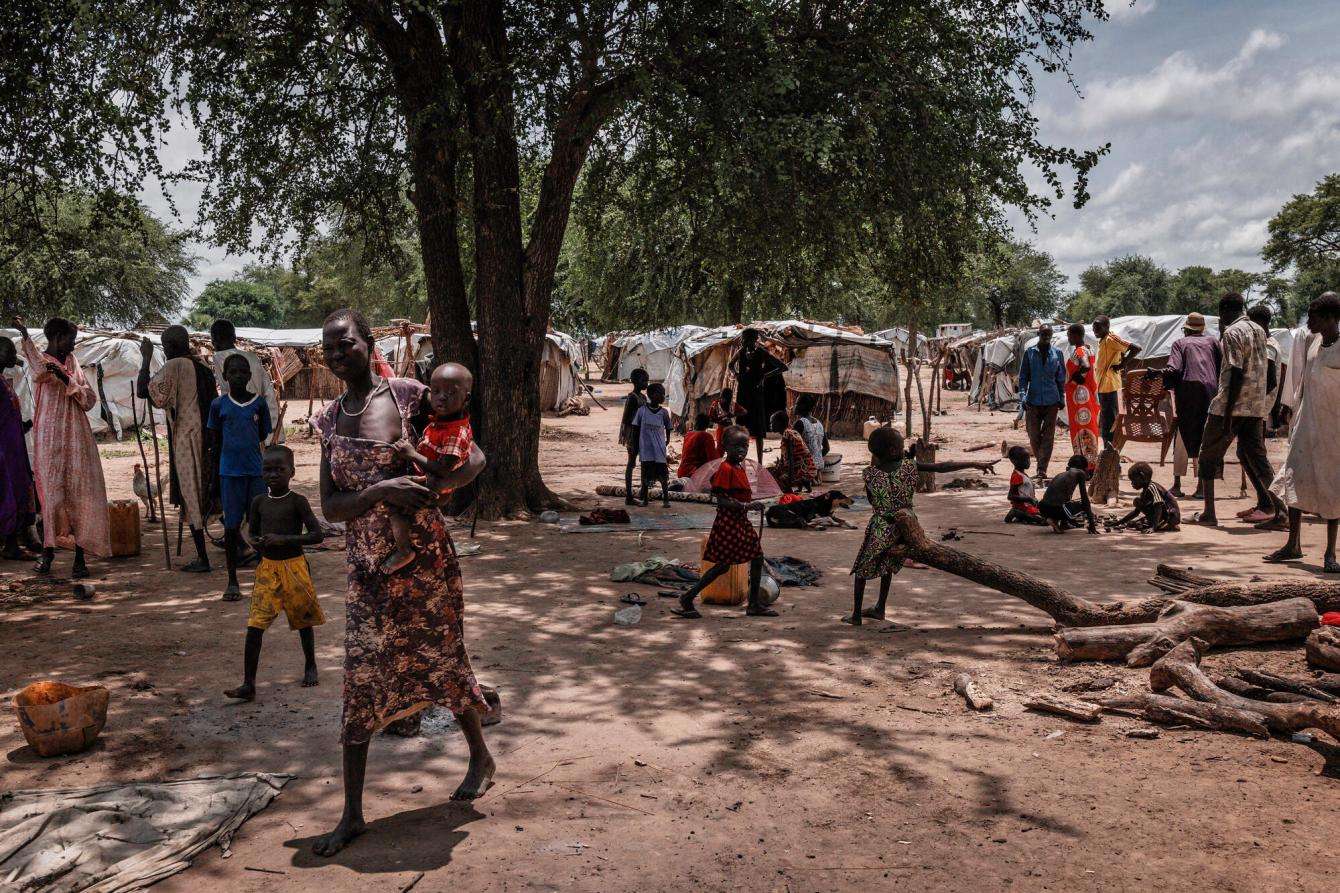
Since the beginning of the war in Sudan, over 740,000 people have crossed into South Sudan to seek refuge. The majority are South Sudanese returnees—people who had previously fled to Sudan during the civil war in South Sudan, which ended in 2018.
The influx of displaced people has further stretched an already overwhelmed system. In the transit centers, the situation is getting worse with increasing food insecurity and health issues including severe malaria cases, eye infections, acute bloody diarrhea, and risk of cholera. There is a lack of funding for water, sanitation and hygiene programs across South Sudan, which is particularly concerning as acute watery diarrhea is a top comorbidity among acutely malnourished children under 5 years old admitted to MSF facilities and as cholera outbreaks have been reported in Sudan.
MSF is responding to the refugee crisis in Renk and Bulukat in Upper Nile state. MSF’s Abyei project is also impacted, with a largely under-estimated 17,404 returnees who have arrived through the Amiet point of entry.
MSF has been present in Sudan since 1979, witnessing historic changes and escalating needs in response to the rapid shifts in the country’s political and social dynamics, which in turn impact health needs.
Our intervention began shortly before the Second Sudanese Civil War (1983-2005), which was fought primarily between the north and south of Sudan and was one of Africa's longest civil wars. MSF was actively involved in providing medical care to war-affected communities dealing with massive displacement, famine, and the outbreak of diseases. With the independence of South Sudan in 2011, MSF continued operations in both countries, adapting to the shifting dynamics of conflict and the division of resources.
When the war broke out in April 2023, many activities were either stopped or shifted to respond to the emerging needs and emergencies across the country. Some activities continued—in Darfur, for example—thanks to the efforts of our locally hired MSF staff, who continued to work despite the extremely difficult personal and environmental circumstances.
MSF provides medical care to anyone who needs it, regardless of race, religion, or political affiliation. We are calling on all parties to the conflict to ensure the safety of civilians, medical facilities, and personnel. Hospitals must remain a sanctuary for people seeking care.
To facilitate our humanitarian and medical work, we speak to all parties to the conflict to request safe, rapid, and unimpeded access to civilians who require medical care and to ensure the safety and security of our staff. This is why our independence and impartiality are essential to our work in all the places we operate across the globe.
MSF emergency medical coordinator Ali Mohammed describes the horrors he witnessed in Sudan, where civilians are suffering the most.
July 22 12:23 PM
The warring parties have inflicted horrendous levels of violence on people since April 2023.
Read More
July 11 09:32 AM
MSF staff from El Geneina share stories of survival amid ongoing conflict and displacement
Read More
July 10 10:43 AM
Hands-on support is no longer possible due to multiple attacks and repeated threats to staff.
Read More
June 19 06:00 AM
“All the responsibilities fall on me. I am now the mother and the father.”
Read More
June 18 12:06 PM
More than 680,000 people have fled the war in Sudan to South Sudan over the past year, with limited food, water, shelter, sanitation facilities, and medical care.
Read More
May 21 01:55 PM
The MSF-supported South Hospital in North Darfur state is receiving casualties as the health system faces further strain.
Read More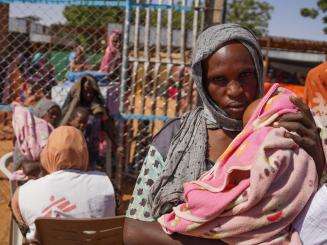
May 15 09:08 AM
MSF is calling for all sides to ensure the protection of civilians, medical facilities and medical personnel.
Read More
May 17 08:48 AM
People displaced by fighting in Sudan’s Central Darfur region are sheltering in abandoned buildings and surviving with limited assistance.
Read More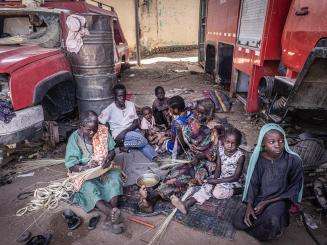
May 12 12:28 PM
The hospital has been forced to close.
Read More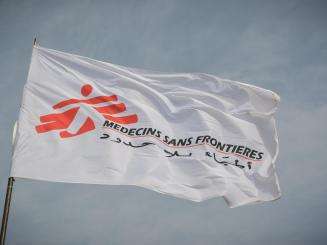
May 09 01:00 AM
The difficult decision comes after relentless challenges including growing insecurity, denial of travel permits, and repeated security incidents.
Read More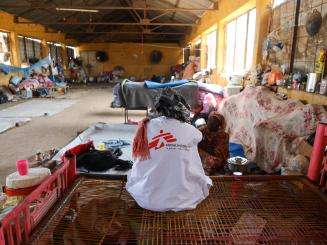

How a massive humanitarian crisis has unfolded over the past year in Sudan.
Some humanitarian crises make the headlines—others don’t. Unrestricted support from our donors allows us to mobilize quickly and efficiently to provide lifesaving medical care to the people who need it most, whether those needs are in the spotlight or not. And your donation is 100 percent tax-deductible.